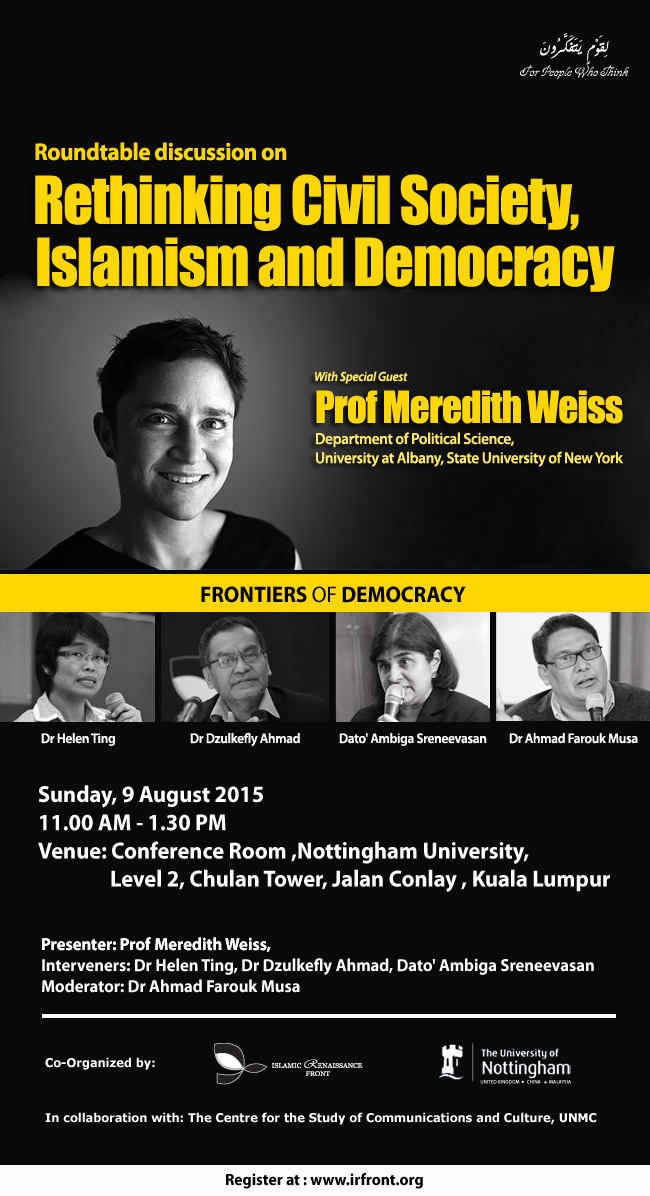
Date: Sunday, 9 August
Time: 11AM – 130PM
Venue: Conference Room, University of Nottingham, Level 2 Chulan Tower, Jalan Conlay, Kuala Lumpur
Registration: https://www.eventbrite.com/e/roundtable-discussion-on-rethinking-civil-society-islamism-and-democracy-tickets-17993835045
Civil society, understood as ‘a cluster of institutions and associations strong enough to prevent tyranny, but which are, nevertheless, entered freely rather than imposed either by birth or by awesome ritual’ has always had positive normative connotation.
In democratic societies, the existence of an autonomous space between the state, market and the family is believed to sustain the democratic political system, due to its ability to bring citizens together. The voluntary nature of movements which mobilize around very different and, at times, conflicting issues and interests allow society to develop ties that transcend kinship, and that do not see the state as the ultimate provider of material goods and services.
The existence of such an active civil society is interpreted as a positive development for democracy, because it promotes the interaction of people in a voluntary setting, where differences of opinion have to be taken into account because such groups have diverse interests. Now could these positive connotations then be transferred to authoritarian states or democratizing countries? Or could the independent social actors prise away an autonomous sphere of action that would be vital in undermining the authoritarianism that characterizes the political and social relationships? And finally, could civil society play an active role in the demise of authoritarianism?
But there appears to be a problem with merging Islamism with civil society since its perceived incompatibility with a pluralist democracy. The activism of the Islamists is perceived to be uncivil rather than civil, and therefore, more conducive to authoritarian political and social relationship than to democratic ones. There is also an underlying assumption that all the movements that subscribed to Islamism are inimical to democracy. And that they have a totalitarian ideology, whose essence and objective are to transform the human nature and society once they manage to acquire power.
But could there be room to locate an Islamist civil society that can come to terms with the procedures of democracy and the pluralism of ideas through interaction and cooperation with others? Is Islamist civil societies a devious group bent on “lying” their way to power? These are some of the main issues to be dissected and debated in this roundtable discussion.
Program:
1030-1100: Registration
1100-1105: Opening speech by Dr Tessa J Houghton, Assistant Professor of Media and Communication Studies, University of Nottingham
1105-1110: Welcoming speech Prof Zaharom Nain, Professor of Media and Communication Studies, Faculty of Arts, University of Nottingham
1110-1115: Speech by moderator, Dr Ahmad Farouk Musa
1115-1145: Presentation on “Rethinking Civil Society, Islamism and Democracy” by Prof Meredith Weiss, Department of Political Science, University at Albany, State University of New York
1145-1200: Intervener I: Dr Helen Ting
1200-1215: Intervener II: Dr Dzulkefly Ahmad
1215-1230: Intervener III: Dato’ Ambiga Sreneevasan
1230-1330: Discussion
1330: Lunch
Jointly organized by:
Islamic Renaissance Front (IRF) and The Nottingham University Malaysia Campus (UNMC)
In collaboration with
The Centre for the Study of Communications and Culture, UNMC

